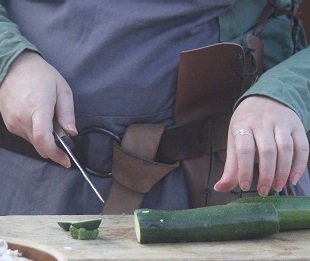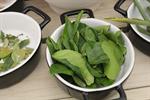Study, Learn and Work in the Food Service Industry
Job growth will continue to rise - opportunities are there!
 Start a business, get a job, or increase your value to your employer, secure a salary paid post, enhance your career prospects.
Start a business, get a job, or increase your value to your employer, secure a salary paid post, enhance your career prospects.
- Food service is a business that has changed as people's expectations change. We see food, dining, wine and beverages trending on social media and in mainstream advertising.
- There will always be in employment in the food services industry - whether you enjoy the rewarding pleasures of food and sharing that with your customers. Or if you prefer to work behind the scenes... the opportunities are limitless for business or career.
- This course can be your entry point or will provide a significant boost to your career prospects.
Mechanisation and the use of convenience foods have altered jobs in the kitchen significantly, and shrinking profit margins require more efficient and profitable working. It is therefore very important to train and develop staff (succession planning) not only in technical skills but also in supervisory and management skills.
COURSE STRUCTURE AND CONTENT
There are 9 lessons in this course, as outlined below:
1. Human Food and Nutrition
- Introduction
- Quality of ingredients
- Range of ingredients
- Cooking methods used
- Eating
- Major food groups
- Carbohydrates
- Fats
- Proteins
- Grains
- Vegetables
- Vitamins and minerals
- Food allergies
- Terminology
- Weight and energy conversions
- Resources
- Networking - for restaurant managers, food industry employees
2. Cooking
- Nutritive value in cooking and processing
- Cooking different types of foods
- Meat
- Fish
- Milk
- Plant foods
- Effect of cooking methods on nutrients
- Baking
- Blanching
- Braising
- Grilling
- Poaching and boiling
- Pressure cooking
- Roasting
- Sautéing
- Steaming
- Preparing vegetables
- Benefits of cooking
- Preserving nutrient value in food
- Managing different nutrients -heat sensitivities, etc.
- Canning and pasteurisation
- Homogenisation and pasteurization of milk
- Freezing
- Dehydration
3. Kitchen and Food Management
- Effect of cooking on nutrition
- Managing food contamination
- Contaminants during food processing
- Pathological contamination
- Preventing food poisoning
- Food laws and labelling
- Labelling
- Dating
- Special purpose foods
- Ethics of food additives
- Allergies, sensitivities and poisoning
- Common food allergies
- Kitchen design
- Equipment design
- Criteria for selecting equipment
- Equipment inventory
- Managing a freezer
- Preparation areas
- Vegetable preparation
- Salad preparation
- Meat preparation
- Fish preparation
- Pastry preparation
- Cooking area
- Central range
- Convection ovens
- Microwave oven
- Cleaning area
- Waste disposal
- Food service equipment
- Food service management
- Traditional kitchen staff roles -types of chefs, divisions of larder, pantry, tournants etc
- Menu and production planning
- Types of production - A la Carte, Table d'Hote, Call-Order, etc
- Activities in cook-freeze operation
4. Planning A Menu
- Needs of special groups
- School children
- Adolescents
- Expecting mothers
- Nursing mothers
- The elderly
- Immigrants
- Vegetarians
- Menu planning
- Assessing diets
- Assessing your own dietary intake
- A typical diet at a residential school
- Plate waste
- Assessing plate waste
- Diet formulation
- Food additives
- Preservatives
- Additives for enhancing appearance and colour
- Flavouring agents
- Sweetening agents
- Emulsifying agents and stabilisers
- Anti caking agents
- The menu
- Planning
- Types of menus
- Menu composition
- Beverages
- Wine and alcohol lists
- Non alcoholic drinks
5. Alcoholic Beverages
- Wine
- Common white grape varieties
- Common red grape varieties
- Wine processing
- Fortified wines -sherry, port, marsala, maidera, vermouth.
- Beer
- Types of beer
- Beer tasting and characteristics
- Spirits - Brandy, Whisky, Gin, Rum, Vodka
- Liqueurs
- Liqueur coffees
6. Tea, Coffee and Non-Alcoholic Beverages
- Water
- Providing water
- Soft drinks
- Fruit juices
- Non alcoholic cocktails
- Coffees
- The coffee blend
- Grinding coffee
- Making coffee
- Problems with coffee
- Non alcoholic coffee substitutes
- Teas
- Specialty teas
- Green tea
- Common herb teas
7. Scope and Nature Of Catering Services
- Vending machines
- Popular catering
- Hospital catering
- Airline catering
- Function catering
8. Personnel Management
- Reservations and bookings
- Reservation systems
- Direct or indirect reservations
- Contracts
- Cancellation procedure
- Refund policy
- Basic waiting techniques
- Holding a Service Spoon and Fork
- Carrying Plates
- Using a Service Salver
- Using a Service Plate
- Carrying Glasses
- Carrying Trays
- Using a Waiter’s Friend
- Interpersonal skills
- Addressing customers
- Dealing with complaints
- Staff recruitment
- Advertising a position
- Interviewing
- Training staff
- Different ways of learning the job
- Self esteem and motivation
- Assessing training needs
9. Management Of Catering Services
- Restaurant marketing
- Feasibility research
- Competitive analysis
- Market analysis
- Financial analysis
- Advertising and PR
- Food purchasing
- Purchasing methods
- Tendering
AIMS
 Explain the role of different food types in human health.
Explain the role of different food types in human health. - Understand the alternative cooking processes, in order to make appropriate decisions about the cooking of different foods
- Manage the provision of kitchen facilities, and the handling of foodstuffs (including food storage and preparation), in order to maximise efficiency, hygiene and service with the restrictions of facilities available.
- Plan menus or list of food products for sale, appropriate to different situations.
- Manage the provision of alcoholic beverages appropriately, in different situations
- Manage the provision of non-alcoholic beverages appropriately, in different situations.
- Describe differences in appropriate management for catering in a range of varying situations.
- Discuss how to manage staff in the food and restaurant industries.
- Consolidate skills developed throughout this entire course into an overall understanding of management of catering services.
MENU AND PRODUCTION PLANNING
 This planning should be the result of a group decision by managers - not just the chef. One appreciates that the skilled chef, in designing his menu, takes into account previous sales figures, which reflect customer preferences. He needs to consider the menu balance, texture, flavour, taste, blend of different cooking methods, and (perhaps) the use of left overs. He will take account of his staff, and their ability to produce any standard or variable menu using the equipment available.
This planning should be the result of a group decision by managers - not just the chef. One appreciates that the skilled chef, in designing his menu, takes into account previous sales figures, which reflect customer preferences. He needs to consider the menu balance, texture, flavour, taste, blend of different cooking methods, and (perhaps) the use of left overs. He will take account of his staff, and their ability to produce any standard or variable menu using the equipment available.
Methods of Kitchen Production
Forms of kitchen production can include:
*A La Carte Production
This can be defined as the traditional method of the conventional or partie system. The menu offers a wide choice of dishes and prices. On the kitchen production side, a certain amount of mise en place or advance preparation is done for each service, for example, garnishes, sauces and the like. Apart from this, all dishes ordered sur la commande are cooked to order. This requires a flexible system in the kitchen, and relies upon the work of skilled staff.
*Table d'Hote Production
A set menu is easier to organise and produce in a kitchen. It consists of each section of the kitchen department producing a set number of portions of each course at each meal service. The meal can then be dished up and served from a hot plate as required. This is a straightforward service and it is one that can be geared to a personal waiter or waitress service, or to various forms of self-service (eg. buffet). This system is less onerous than a la carte, and may not require such a high degree of skill from staff. It also allows generous portions to be produced at lower cost.
*Call-Order Production
This is the type of service used to provide room service meals in a hotel. It requires less equipment than for an a la carte operation. The menu is normally restricted in size and scope, and is commonly made up of convenient, easy to prepare foods. Typical equipment needed might be refrigerators, grills, toasters, deep fryers, microwaves and convection ovens.
*There are also other systems such as a very sophisticated a la carte system (where no food is pre-prepared), or a simpler system, where all food is served cold (eg. fruit, ice cream, sandwiches, etc).
ACS Student Comments
"I have enjoyed the course and would study with ACS again"
D. Hennessy
"It was a very good and interesting course.... I was able to learn a lot more about working in kitchens"
J. Towers
To secure a job in the industry it would be helpful to think about
- gaining experience working alongside a manager or assistant manager who can act as mentor
- building confidence and knowledge of financial systems
- demonstrating your flexibility to respond to a range of work situations - give a prospective employer a chance to see what you can do to resolve situations
- take on short courses for professional development as that shows you're committed to delivering high levels of customer service
- having a can-do, positive attitude
- demonstrate you have good communication skills - this includes listening, talking and body language.
ARE YOU THINKING WHAT NEXT?
It may only take you a few minutes or hours to decide to take this course. You will reap the rewards of the knowledge and enjoyment gained from studying Food and Beverage Management course for years to come!
Get ready for your next step or contact our friendly staff if you have questions
Email us at info@acsedu.co.uk
use our FREE COUNSELLING SERVICE to contact a hospitality tutor
Call us on 01384 442 752